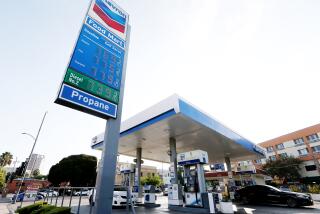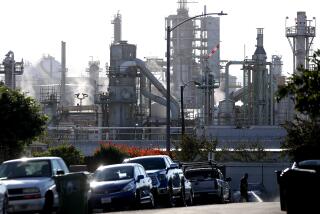Chinese fuel prices continue record rise
- Share via
Reporting from Beijing — The pain at the pump can be felt in China too.
The world’s second-largest oil consumer raised retail prices for gasoline and diesel fuel Tuesday by their widest margin in 33 months.
The price of 90-octane gasoline now costs a record $4.43 per gallon -- about 10 cents more than the average in California, according to the American Automobile Assn.
It was the second time in less than six weeks that the government raised prices to try to keep pace with the soaring cost of crude oil, which has been hovering around record highs.
Unlike the U.S., energy costs in China are determined by the central authorities, partly to maintain social stability.
Inflation grew at its slowest pace in 20 months in February, giving Beijing the confidence to adjust fuel prices without inciting members of the public who were reeling last year from skyrocketing food costs, analysts said.
The increase should ease pressure on China’s two main refiners, the state-owned China Petroleum & Chemical Corp. and PetroChina Co., which are not allowed to pass costs on to consumers. The two have reported billions of dollars of losses already because of soaring crude prices.
The government said retail gas prices would increase 6.5% and diesel 7%, the biggest increases since June 2009.
China, the world’s largest automobile market, last raised fuel prices Feb. 8, lifting gas by 3% and diesel by 4%.
Chinese policymakers determine pricing by measuring a basket of global crude prices over a 22-day window. If those prices change by more than 4% in that time frame, domestic fuels costs have to be adjusted. Brent crude oil rose by 11% in February.
Du Peixia, an energy analyst at Bohai Futures Co. in the eastern Chinese city of Dalian, said Chinese demand could remain robust despite the price hikes.
State subsidies for fuel will stay in place to protect grain, forestry and fishery producers as well as public transportation systems, according to China’s National Development and Reform Commission, the central government authority charged with determining gas and diesel prices.
“Short-term Chinese demand will depend on how many of these subsidies remain,” Du said. “In the long run, prices are only going to continue increasing because Chinese demand will keep going up.”
Gas prices in China have risen by nearly 50% from 2009 and have almost tripled since 2000.
That hasn’t gone unnoticed for working-class Chinese.
Huang Wanjun, a driver for hire in Beijing, calculated he’ll have to spend an additional $16 a week on gas because of Tuesday’s hike.
“Our income hasn’t increased, but everything else has, like food, housing and especially the price of gas,” said Huang, 32, who drives a 2009 Chevrolet four-door. “I knew the price was going up as I watched the news and it said that international oil prices were increasing, but today I was still shocked.”
RELATED:
China’s inflation rate drops to 20-month low
In China, once-thriving Apple scalpers are struggling
U.S. opens trade case against China over rare earth export limits
More to Read
Inside the business of entertainment
The Wide Shot brings you news, analysis and insights on everything from streaming wars to production — and what it all means for the future.
You may occasionally receive promotional content from the Los Angeles Times.









